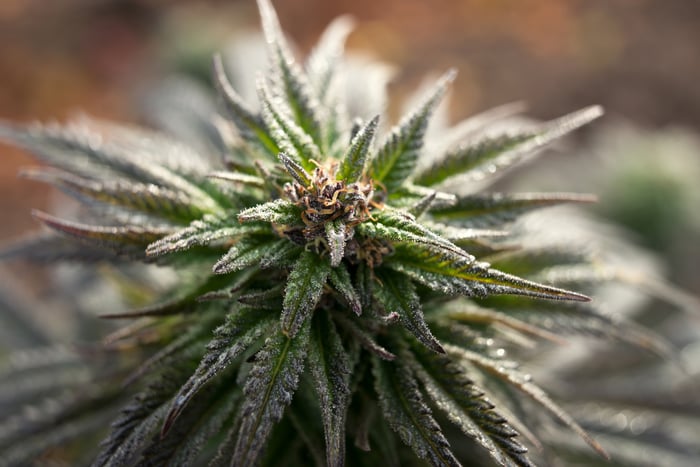This was supposed to be the year that the cannabis industry shrugged off its label as a speculative investment and showed Wall Street that it was a viable long-term investment opportunity. The thinking had been that, with Canada legalizing adult-use cannabis in October 2018 and legalization momentum building in the U.S., pot stocks would deliver profits in 2019. But to utter a widely used cliché in the cannabis space, these forecasts have gone up in smoke.
Although there have been a few marijuana stocks to rise over the course of the year, most have been taken to the woodshed. Maybe none of the declines has been more surprising to investors than Aurora Cannabis (ACB -0.15%), which has lost 55% year to date.
The reason I refer to this as "surprising" is that Aurora Cannabis is, by far, the most popular pot stock on the planet. On online investing app Robinhood, nearly twice as many members are holding Aurora Cannabis' stock as the second most-held stock on the entire platform. And according to one investment analyst, things could still get a whole lot worse for the company.

Image source: Getty Images.
Aurora Cannabis could go to $0
In a research note released last week, founder and CEO Gordon Johnson of Chicago-based investment firm GLJ Research handed out the ultimate insult a sell-side analyst can ascribe any publicly traded company -- he set Aurora Cannabis' price target at $0 -- zilch, nada, nothing! Effectively, he believes the company is worthless and that its shareholders will be completely wiped out before 2020 is over.
The primary gist of Johnson's thesis is that Aurora Cannabis is facing an imminent cash crunch for which it has no answer. Specifically, Johnson cites that trouble could be brewing with a $360 million Canadian credit facility with the Bank of Montreal (BMO -0.77%). There are a number of restrictions on this credit facility that could take effect by Sept. 30, 2020, which, if triggered, would result in quicker repayment of what the company owes. That's a problem considering that Aurora hasn't landed a lucrative equity investment like its peers Canopy Growth and Cronos Group have and therefore isn't sitting on a lot of available cash.
What's more, the line of credit with Bank of Montreal is secured, among other things, by Aurora's Aurora Sun and Aurora Nordic 2 growing facilities. In Aurora's fiscal first-quarter report, the company announced that it would be suspending construction on both facilities in order to conserve capital and align production with demand. Having once forecast 625,000 kilos of annual run-rate output by the end of its fiscal 2020 (June 30, 2020), halting most output at these two facilities will likely halve its run-rate output by midyear. With lenders like Bank of Montreal more than likely worried about this move, it could effectively cut Aurora off from additional forms of nondilutive financing.

Image source: Getty Images.
Furthermore, Johnson continues to see more dilution coming from Aurora via its at-the-market shelf offering, and believes that fundamentals tied to the Canadian cannabis market could deteriorate even more in the upcoming year. This essentially dooms Aurora to ongoing losses as it attempts to work through its cash crunch.
"As the pace at which Aurora Cannabis is burning cash becomes clear to the market, barring additional resources from the capital markets, our work suggests the company will run out of cash before 7/1/20," according to Johnson's research note.
But wait, there's more
The thing is, GLJ Research's scathing review of Aurora Cannabis still fails to encompass all of the negatives associated with the company.
In particular, Johnson's research note fails to mention the company's ballooning goodwill stemming from its more than one dozen acquisition since August 2016. Though goodwill (i.e., the premium a company pays above and beyond tangible assets for an acquisition) is relatively common following an acquisition, Aurora's CA$3.17 billion in goodwill represents 57% of the company's total assets, which is a high-water mark among cannabis stocks. The plan had been for Aurora to build out its acquired infrastructure and utilize purchased patents to recoup this premium, but this looks incredibly unlikely given the early-stage struggles the Canadian pot industry and company are experiencing. In other words, a massive writedown could await Aurora and its shareholders sooner rather than later.

Image source: Getty Images.
Johnson also didn't touch on the company's international operations, which have been nothing short of a disappointment so far. When considering cultivation, export, research, and partnership agreements, Aurora has a broader global presence than any other pot stock (24 countries outside of Canada, to be exact). Unfortunately, many of these overseas countries are still in the process of developing medical marijuana regulations, and are therefore not importing cannabis as of yet. Also, regulatory agency Health Canada is counting on domestic growers to fulfill Canadian demand first before exporting their product overseas. The end result is that virtually no revenue has been generated from international sales, despite Aurora's hefty overseas investments.
As Johnson did briefly touch on, Aurora's share issuances are also a major nuisance for investors. Having limited access to nondilutive forms of financing, the company has regularly turned to share issuances to finance its acquisitions and ongoing operations. In fact, a recent amendment to the company's CA$230 million convertible debenture will see most noteholders issued new shares of stock. In 5.5 years, Aurora's outstanding share count has skyrocketed from 16 million to probably close to 1.1 billion (as of today), and it's the company's shareholders that continue to pay the price.
While I've been decidedly negative on Aurora Cannabis for more than a year, I'm not sure if I believe the stock goes to $0 over the next year. I do, however, see few upside catalysts and plenty of reasons for investors to worry. That makes Aurora a cannabis stock to avoid like the plague in 2020.





